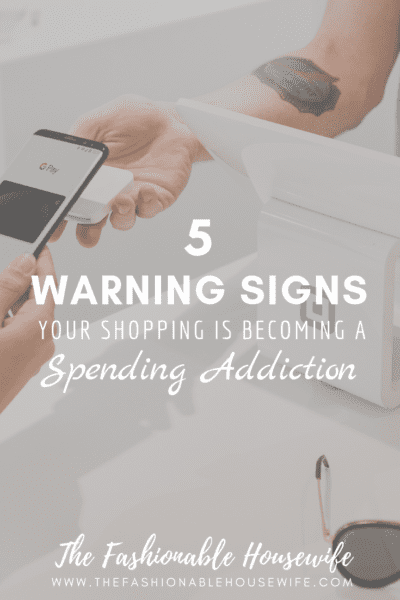
You see it, you want it, and you buy it. Is this your cycle when it comes to shopping? Are you obsessed with sales? Do you often find yourself with a ton of stuff that you bought but did not like afterward? You may be suffering from a spending addiction.
Many people do not even know there is such a thing. We all consider ourselves good with money. However, a look at surveys carried out on shopping habits is shocking. 31% of respondents admitted to buying things because they are on sale. One in ten admitted to shopping because of their mood. Let us delve deeper.
What Is Spending Addiction?
Spending addiction is a compulsive behavior that involves making unnecessary, often expensive, and purchases.
It qualifies as an addiction because it carries symptoms found in disorders that are recognized medically. Its inclusion in the Diagnostic and Statistical Manual of Mental Disorders is now being considered.
Causes of Spending Addiction
The causes of spending addiction vary. Some of the causes include
- A history of deprivation
- Perfectionism
- Impulsiveness
- A way to cope with the feeling of emptiness
- Significant loss
The variation in causes leads to several different types of shopaholics.

What Are the Warning Signs?
The following could be critical signs that you or a person close to you has a spending addiction.
1. You are Often Tempted to Buy Things You Do Not Need
You always find yourself purchasing items you can do without. These include adding an 11th designer bag to your collection, which you do not see yourself carrying, but you are obsessed with the idea. Splurging on one category instead of random stuff does not make it any different.
2. You Experience a Rush of Excitement When You Shop
People with spending disorder get addicted to the feelings their brains experience when shopping. Their brains release pleasure-related hormones, namely dopamine, and endorphins. This feeling causes eventual addiction.
The reverse is usually true. They feel frustrated and anxious when they fail to shop. Shopaholics have been reported to experience changes in their mood when they fail to shop at all. They resort to shopping online if they are unable to do so physically.
3. You Shop More Than You Can Afford
It is a bad sign when you find yourself buying more things than you can afford to buy, especially on credit. Some shoppers have been seen to max out their credit cards, which leads them to get new ones.
Struggling to sustain the urge to shop will lead to many arguments in relationships. Dishonesty arises when one partner knows their spouse does not approve of their spending habits.
4. You Find Yourself Wondering Why You Made Certain Purchases
Do you often find yourself wondering why you bought some things soon after you did so? Shopaholics end up regretting buying most of the things they buy because they end up realizing that they didn’t actually need them. It leads to a feeling of remorse. Some even describe the feeling as ‘shame’ when they end up with a bunch of unopened items in their living space.
5. You Struggle to Hide Your Shopping Habits
If you find the need to conceal your spending behavior because you are not very proud of it, then you just might be having a problem. Whether you hide the things you buy from your significant other or turn your computer in the office while shopping online, this could be a sign.
Effects of Shopping Addiction
Many spending addicts end up becoming financially unstable. This could be from spending all their money on purchases. Some have been observed to be spending money allocated to their basic needs.
Relationships suffer whenever one or both persons are spending irresponsibly. This is because of the inability to refund borrowed cash, being late on bills, a lack of savings, and so forth. It is also hurtful to others when they lend you money only for them to see you wasting it.
The effects of addictions on jobs and careers are quite significant. Compulsive spenders could end up losing their jobs because of the inability to fulfill their duties. Spending too much time shopping online at the expense of your responsibilities at work can lead to such consequences. Some may find this absurd, but it could happen.
Strategies to Beat Spending Addiction
These strategies will work if you admit to having a problem and then do something about it.
Cut Up Your Credit Cards
If you are a compulsive spender, consider using cash only. Take that drastic step without thinking otherwise. Don’t justify why you need them. Just do it!
Anything that fuels your desire to shop excessively should go. It does not mean that you can’t have credit cards ever again. It’s an option you may consider once you get better.
In the meantime, carry cash only and use debit cards. Debits cards such as the Turbo prepaid card will pay for items just like a credit card. However, you will have a constant reminder that you are spending the real money.
Make a Budget and Record Expenditure
Make a point to note down every penny you spend. You have to be intentional because it will not be easy. It will be easier to work on yourself when you see your spending pattern. You will be able to find out where you spend your money.
There are numerous personal finance applications available freely. Some have wonderful features, including being able to take pictures of your receipts. They also allow you to categorize your expenditure. You will see where most of your money goes. Make use of the apps so you don’t go into debt.
Get Help and Make the Changes Permanent
There is a lot of wisdom in asking for assistance when you feel like you need it. Download personal finance apps and make sure you talk to people who are close to you for support. Having to be accountable to someone you respect will certainly help you check the behavior. Some people even go ahead to ask for professional help, which is commendable.

Beating spending addiction is one of the best things you can gift your financial life. We hope you will start making more rational purchase decisions.
Keep browsing this blog for more personal finance tips.



